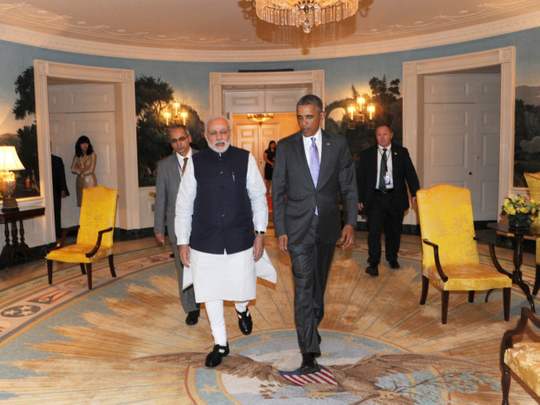
Washington: President Barack Obama took a first chance to size up Narendra Modi on Monday, as the new Indian Prime Minister, an intriguing novice on the world stage, brought a tour which wowed New York to the White House.
Modi met Obama, Vice-President Joe Biden and other key US officials at the White House for a private dinner, ahead of formal talks in the Oval Office on Tuesday.
Washington hopes that the visit, following the landslide election victory of Modi’s Bharatiya Janata Party in May, will turn a page in relations with New Delhi which are deeply valued here but have been under strain in recent years.
Modi and Obama sat down under a gilded chandelier in the antique-festooned Blue Room of the White House, in a group of 20 officials of both sides, also including Secretary of State John Kerry and Indian Foreign Minister Sushma Swaraj.
Both nations issued a joint “vision statement” promising that their “strategic partnership” would work to combat terror threats, respond to humanitarian disasters, prevent the spread of weapons of mass destruction, and to “mitigate” the impact of climate change.
Modi warmed up for the White House visit by basking in a rock star welcome in New York in which he spoke to thousands of members of the Indian diaspora at the Madison Square Garden sports arena and addressed the United Nations.
Since he took office, Washington has made strenuous efforts to court the new Indian leader — sending several cabinet level delegations to New Delhi and pushing for an early visit to the United States by the new premier.
‘Historic moment’
“This is a historic and pivotal moment in the history between our two great democratic nations,” said a senior US official.
As he arrived in the United States on Friday, Modi said in an article in the Wall Street Journal that “India and the US have a fundamental stake in each other’s success.”
“The complementary strengths of India and the US can be used for inclusive and broad-based global development to transform lives across the world.”
The White House took that as a sign that despite some nettlesome differences, notably over trade, Modi was committed to a relationship that US officials see as a fulcrum of Obama’s policy of rebalancing US foreign policy towards Asia.
“What we are hearing from our Indian counterparts and what gives us tremendous excitement and confidence in the direction that we’re moving is a desire to work across all areas of endeavour,” another official said, predicting common ground on bilateral issues and regional and global security.
US officials have welcomed Modi’s vows to slash red tape confining India’s economy and his overtures to business leaders who have long chafed at restrictions on foreign investment in the country.
But Washington is concerned about New Delhi’s recent move to block a key World Trade Organisation pact that would streamline customs procedures and boost global commerce.
Modi said on Monday he was in favour of unfettered trade — but said commerce must be done in such a way that enhances India’s capacity to feed its most impoverished citizens and to protect its emerging middle class.
He said that despite some differences with Washington, the wider relationship could still improve.
“It is not necessary we should have comfort in everything, even between a husband and wife, there is never 100 per cent comfort,” Modi joked at the Council on Foreign Relations.
Indian foreign ministry spokesman Syed Akbaruddin said the two sides would also discuss the future of Afghanistan and the global fight against militant groups such as Al Qaida and Daesh.












